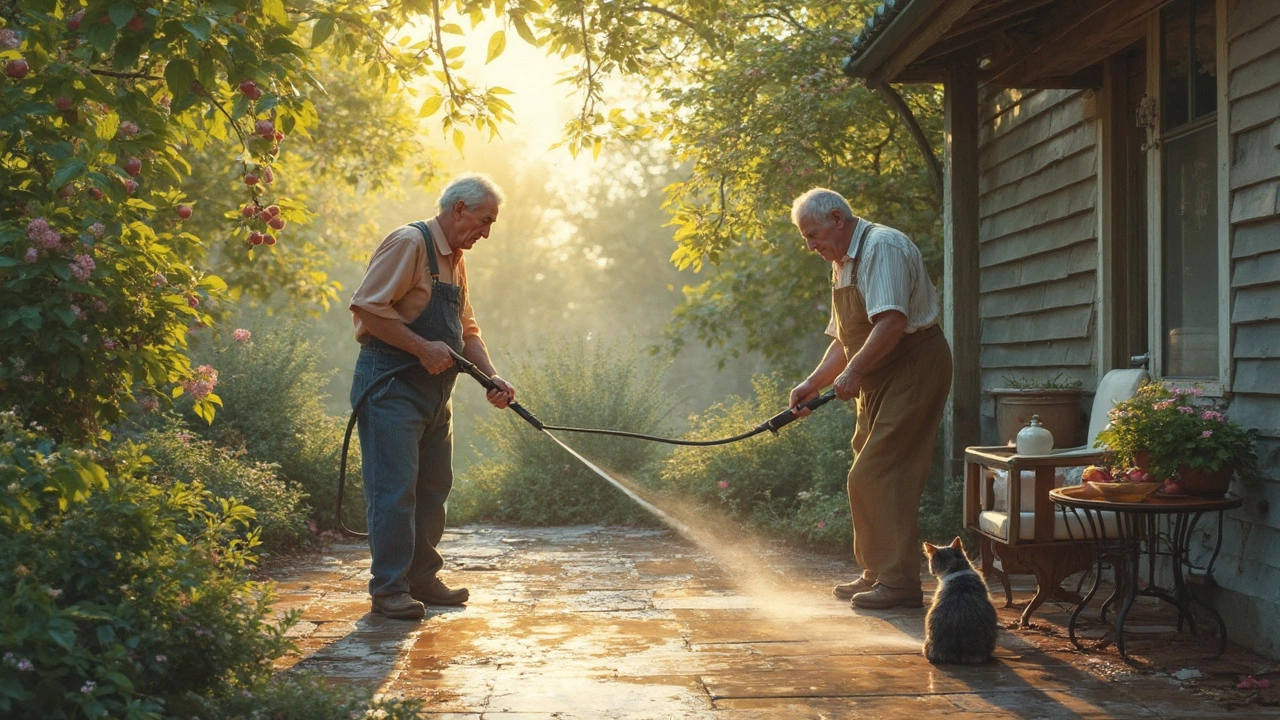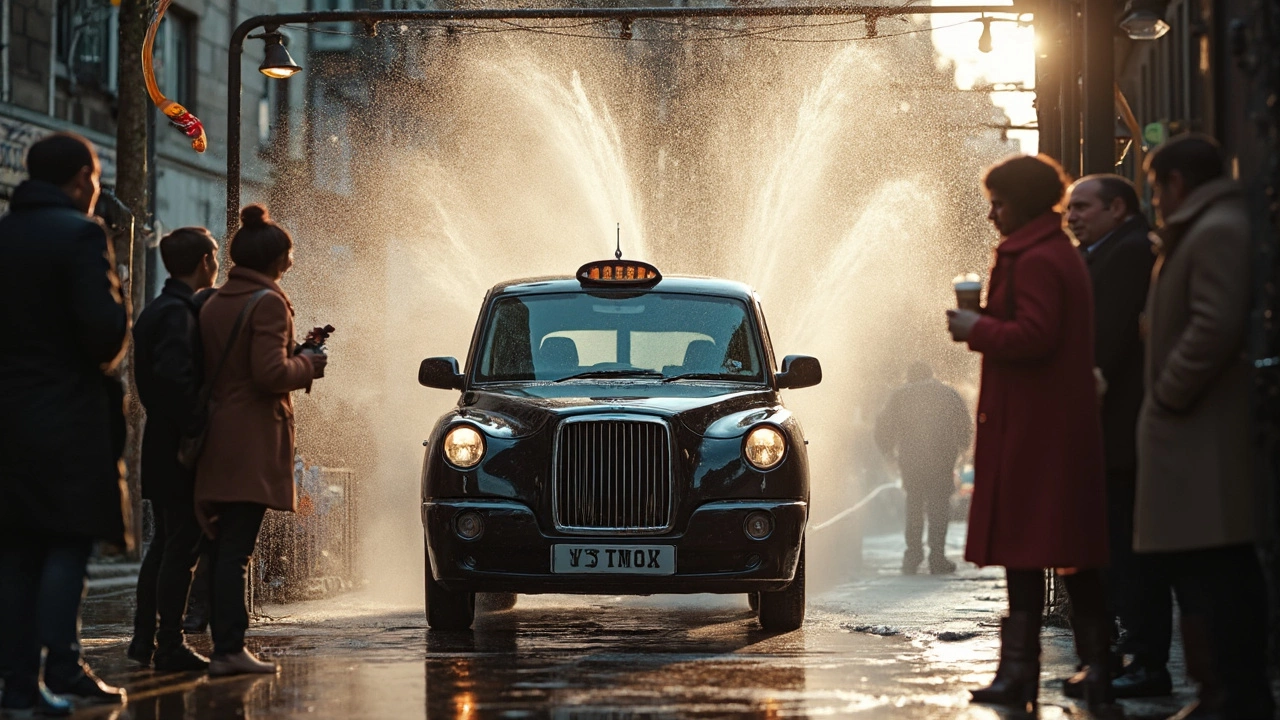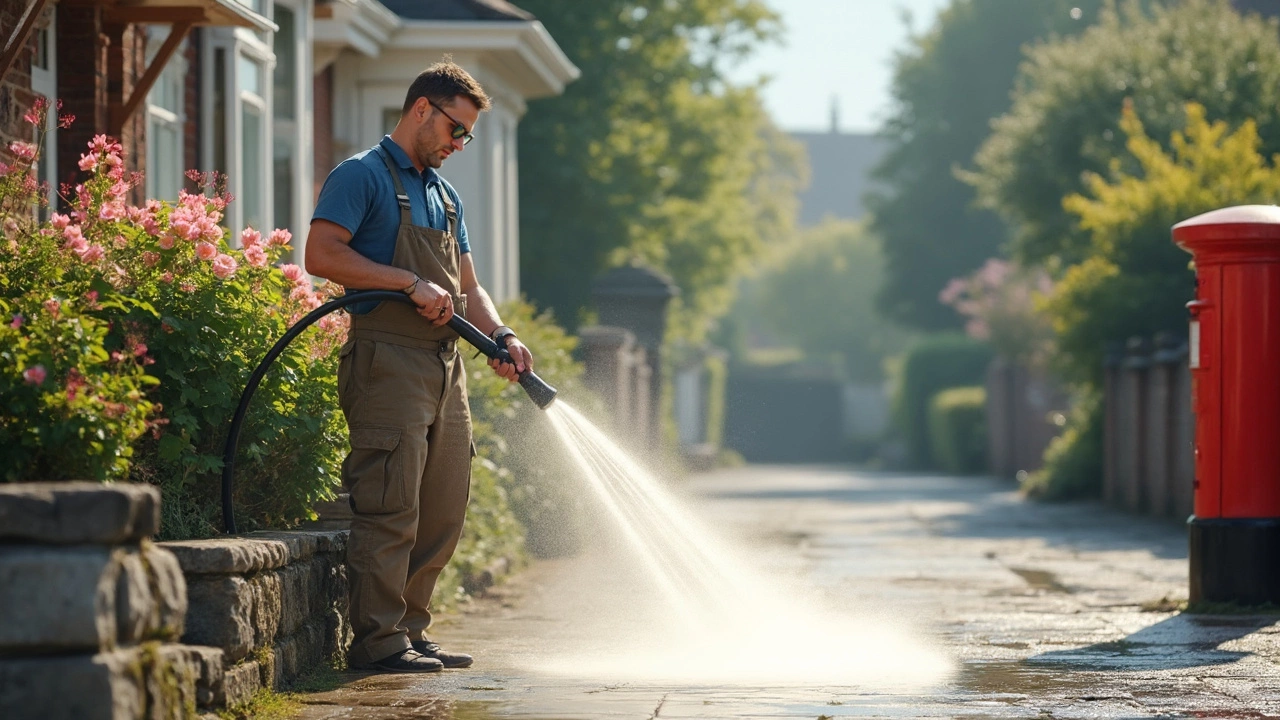Ever thought about how incredible it would be to wash away months of dirt from your driveway in mere minutes? That's the magic of pressure washers. Once considered a tool solely for professionals, they're now the go-to gadget for many households looking to boost their cleaning game.
More and more folks are snapping up these power-packed washers for their cleaning needs. Why? Well, they save you time, effort, and can handle surfaces from the toughest concrete to gentle wood. That's a deal you can't often refuse when it comes to keeping your place spick and span.
It turns out the demand isn't just about sparkling patios or shiny decks. The pandemic has heightened our focus on cleanliness, making pressure washers a household staple. Whether it's your backyard, garden furniture, or even your car, a pressure washer could be your new best friend. Ready to learn why these devices are in demand and how they might fit into your life? Let's continue.
- The Rise in Popularity
- Who Needs a Pressure Washer?
- Different Types for Different Jobs
- Environmental and Economic Considerations
- Tips for Choosing the Right One
The Rise in Popularity
You might be wondering why pressure washers have become such a hot item these days. Well, a lot of it has to do with folks realizing just how powerful and versatile these machines are. A few years back, they were mostly used by pros in the cleaning business. Now, they're a must-have for anyone serious about home maintenance.
One reason for their booming popularity is the surge in DIY projects. As more people take on tasks themselves, having a reliable tool to ease the workload matters. With a pressure washer, cleaning becomes faster and way more effective than scrubbing by hand. Imagine blasting away dirt that's been stuck for months in just seconds. Sounds pretty appealing, right?
During the COVID-19 pandemic, there was a noticeable shift towards cleanliness and sanitization. This added another layer to the demand as homeowners focused on maintaining cleaner environments. Pressure washers fit right into this narrative, offering a quick solution to a widespread problem.
| Year | Global Sales (in million units) |
|---|---|
| 2021 | 8.2 |
| 2022 | 9.5 |
| 2023 | 10.8 |
In recent years, the sales stats for these gadgets are telling. By 2023, global sales of pressure washers hit 10.8 million units. This reflects a growing trend that's not likely to slow down anytime soon.
So, if you're thinking about joining the pressure washer craze, now's a great time. Not only are they in high demand, but the variety available means you can find one that fits your exact needs, whether it's for heavy-duty cleaning or just keeping your outdoor space tidy.
Who Needs a Pressure Washer?
So, you're probably wondering if a pressure washer is the right tool for you. The truth is, these gadgets are not just for commercial use. They're remarkably versatile and can be a lifesaver for ordinary homeowners. Let's break down who might benefit from having one around.
Homeowners Wanting to Boost Curb Appeal
If you're a homeowner looking to spruce up your property's exterior, a pressure washer can be your new best buddy. It's perfect for cleaning driveways, sidewalks, and patios, making them look like new in no time. Forget renting heavy-duty equipment; having your own washer means you can tackle dirt and grime whenever you want.
Vehicle Owners
Do you own a car, bike, or even a boat? Maintaining their appearance can be a chore. A pressure washer makes it a breeze to wash away mud and sap without a lot of elbow grease. It’s easier than the old bucket-and-sponge routine and gets the job done faster.
Garden Enthusiasts
Garden lovers, here's a neat trick: use a pressure washer to clean garden tools, fencing, and even your outdoor furniture. A quick blast can make set-up and clean-up much quicker without waterlogging the area.
Business Owners with Storefronts
For business owners with public-facing spaces, first impressions count. Grimy windows or stained walkways can turn customers off. Use a pressure washer regularly to keep things looking fresh and inviting. It's also great for cleaning signage without damaging it.
Eco-Conscious Cleaners
Thinking about the environment? Pressure washers actually use less water than traditional methods. Some folks are surprised to learn that these devices can clean surfaces using 50% less water than a garden hose, making them a more sustainable choice for eco-warriors.
So there you have it. Whether you're looking to keep your home, vehicle, or business in top shape, a pressure washer is a handy tool to have in your cleaning arsenal, serving a wide array of needs efficiently.

Different Types for Different Jobs
When you're diving into the world of pressure washers, it's key to know that not all are created equal. Each is designed with its own set of strengths to tackle specific tasks. Let's break down what you should know so you make the best choice for your needs.
Electric vs. Gas Pressure Washers
Electric pressure washers are popular for light to medium-duty cleaning jobs. They're perfect for quick tasks like cleaning patio furniture or cars. They're generally quieter and easier to start up, but you'll need access to an outlet, which can limit your mobility.
On the other hand, gas pressure washers pack a more powerful punch and are ideal for heavy-duty jobs like cleaning decks and driveways. They're portable since you don't need a power source, making them great for larger areas. The downside? They tend to be louder and require more maintenance.
Cold Water vs. Hot Water Pressure Washers
Another key distinction lies in the water temperature. Cold water pressure washers are most common and work well for removing dirt and grime from surfaces. They're generally more affordable and easier to use.
Then you've got hot water pressure washers, which take things up a notch. They're fantastic for tackling grease and oil stains, often found in industrial or farm settings. They can be pricier and require more upkeep, but the cleaning power is unmatched.
PSI and GPM Ratings
Ever heard of PSI and GPM? These are crucial when selecting a pressure washer. PSI (Pounds per Square Inch) indicates the pressure level, while GPM (Gallons per Minute) tells you how much water is used. High PSI combined with high GPM means faster cleaning.
For light jobs like washing a car, you'll want something around 1300-1600 PSI. Cleaning a driveway? Look for 3000 PSI or more. Here's a quick table to guide you:
| Task | PSI |
|---|---|
| Cars and boats | 1300 to 1900 |
| Decks and fences | 2000 to 3000 |
| Driveways | 3000+ |
Understanding these types can lead you to the perfect match for your needs, whether it's quick household cleaning or heavy-duty grime removal. Picking the right pressure washer will save you time and make those cleaning tasks much more manageable.
Environmental and Economic Considerations
When considering a pressure washer, it's not just about making things look clean—there are environmental and economic factors to weigh up as well. Balancing these aspects can not only save you money but also help the planet.
Environmental Impact
Using a pressure washer is eco-friendlier than you might think. Sure, they use water, but when compared to traditional hose methods, they're quite efficient. A regular garden hose uses about 8 gallons per minute, while a regular pressure washer typically uses around 2 to 5 gallons. That's a significant reduction!
Also, because they clean surfaces so thoroughly, there's usually a reduced need for chemical cleaners. By minimizing chemicals, you help keep harmful substances out of our waterways.
Economic Benefits
Let's talk economics. Owning a pressure washer can eliminate the need for professional cleaning services, which can become quite expensive over time. Once you've got your pressure washer, you're set up to clean just about anything—saving cash in the long run.
Not to mention, maintaining structures like decks and driveways extends their lifespan, warding off costly repairs. Think of it as an investment in your home's future with some immediate payback for your wallet.
The Numbers
| Method | Water Usage (Gallons per Minute) |
|---|---|
| Garden Hose | 8 |
| Pressure Washer | 2-5 |
This comparison gives you a little more clarity on the eco-friendly side while also conserving resources.
So, if you're considering taking the plunge into pressure washing, know that you're making a choice that's good for your home and the environment. With all these advantages, it's no wonder these devices continue to be in high demand!

Tips for Choosing the Right One
Okay, so you've decided you need a pressure washer. How do you choose the right one when there's a dizzying array of options? Let's break it down to make it easier for you.
1. Determine Your Cleaning Needs
First, think about what you'll be cleaning the most. If you're handling smaller tasks like washing cars or cleaning outdoor furniture, a light-duty machine might be all you need. For larger jobs like blasting grime off concrete or prepping house exteriors for painting, you'll want something more powerful.
2. Understanding PSI and GPM
You'll encounter terms like PSI (pounds per square inch) and GPM (gallons per minute) a lot while choosing a washer. PSI measures how strong the water pressure is, and GPM tells you how much water is flowing. Higher PSI and GPM mean more cleaning power, but it also usually means a higher price.
"Understanding the balance between PSI and GPM is crucial. Too much pressure can damage surfaces, while too little won't get the job done," says John Henderson, a cleaning equipment expert.
3. Electric or Gas?
Bigger isn't always better. If you're using your pressure washer infrequently and for light jobs, an electric one is quieter and easier to handle. They're also easier on the wallet. If you're into heavy-duty cleaning, gas washers offer more power and flexibility, especially for outdoor work.
4. Don't Forget Accessories
The right nozzles and attachments can make a world of difference. For instance, a rotating nozzle can help you tackle stubborn stains, while an extension wand will be very handy for high places.
5. Check for User-Friendly Features
Ease of use is super important. Look for things like easy start functionality, adjustable pressure settings, and hassle-free maintenance options. After all, you want your cleaning to be stress-free.
| Type | PSI Range | Best Used For |
|---|---|---|
| Light Duty | 1300-1900 PSI | Cars, patio furniture |
| Medium Duty | 2000-2800 PSI | Fences, decks |
| Heavy Duty | 2800+ PSI | Driveways, house exteriors |
By keeping these factors in mind and weighing them against your needs, you'll find the perfect pressure washer. Whether you aim to make your home sparkle or gear up for serious cleaning, there's a machine out there with your name on it.
